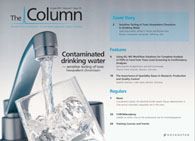Innovation programme
Waters has welcomed the Proteomics Core Facility at the Duke University School of Medicine, Durham, North Carolina, USA, into its Centers of Innovation programme.
Waters has welcomed the Proteomics Core Facility at the Duke University School of Medicine, Durham, North Carolina, USA, into its Centers of Innovation programme. The Waters Centers of Innovation programme recognizes and supports the efforts of scientists facilitating breakthroughs in health and life science research, food safety, environmental protection, sports medicine and many other areas.
In a ceremony at Duke University, the company recognized associate research Professor M. Arthur Moseley, director of proteomics, for his research and support of ongoing research at the School of Medicine to bring about improvements in human health. “With the Proteomics Core Facility our intention was always to provide the highest quality data anywhere in the world for the least expensive price,” said Professor Moseley. “My team and I have had the opportunity to work with some of the sharpest biomedical researchers in the field working on an incredible variety of projects. With the liquid chromatography and mass spectrometry instrumentation we have today, we can ask much more meaningful questions, questions relating to the fundamentals of biology, how proteins interact, how protein expression levels change as a function of a disease state or as a function of drug administration. These technologies put Duke ahead of the curve when it comes to commercially available state-of-the-art proteomic technologies.”
Click here for more information on the Centers of Innovation programme.
This story originally appeared in The Column. Click here to view that issue.

Polysorbate Quantification and Degradation Analysis via LC and Charged Aerosol Detection
April 9th 2025Scientists from ThermoFisher Scientific published a review article in the Journal of Chromatography A that provided an overview of HPLC analysis using charged aerosol detection can help with polysorbate quantification.
Removing Double-Stranded RNA Impurities Using Chromatography
April 8th 2025Researchers from Agency for Science, Technology and Research in Singapore recently published a review article exploring how chromatography can be used to remove double-stranded RNA impurities during mRNA therapeutics production.












